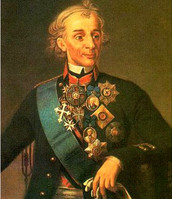
Alexander Vasilyevitch Suvorov, a great Russian commander, was born
On November 13 (24), 1729 (or 1730) was born Alexander Vasilyevitch Suvorov, an outstanding Russian commander, generalissimo, count Rymniksky (1789), prince Italiysky (1799).
Father of the future commander was general in chief of the Russian army, the orderly of Peter I. Under his strict guidance Alexander Vasilyevitch studied artillery, fortification, war history, foreign languages. Having quite a poor health, Suvorov constantly conditioned his organism to the cold, led an ascetic life trying to imitate the ancient commanders.
In 1742, following the tradition of that time, Suvorov was enlisted in to the Life Guards’ Semenov regiment as a private soldier. At the age of 17 he began his active service as a corporal. From that moment his entire life was dedicated to the military service. Later Suvorov wrote about himself: “I am just a military man and other talents are alien to me”.
Having won many victories over the strong rivals Suvorov won the fame of an invincible man and enriched military practice with brilliant examples of successful actions. Over 50 years of his life Alexander Suvorov dedicated to the military service. He took part in seven wars never suffering a defeat and commanded during 60 battles. Alexander Vasilyevitch participated in the Seven years war. During the Russian-Turkish wars (1768-1774 and 1787-1791) he won the victory under Kozludza (1774), Kinburn (1787), Focşani (1789), Rymnik (1789) and took by storm Ismail fortress (1790).
In 1799 Suvorov was at the head of the Italian march during which he defeated the French troops at the rivers of Adda and Trebbia and under Novi. After that he made his armies break from encirclement having made an unprecedented passage over the Swiss Alps. His famous Alpine campaign has made him a legend in the annals of military history. “Defeating everywhere and through your whole life the enemies of the Fatherland, — wrote Paul I to Suvorov, — you lacked another kind of glory: to get the better of nature itself; but you managed to gain the upper hand over it as well”. A long list of Suvorov’s prominent victories was enriched by brilliant feats at Swiss mountain heights. Successful outcome of the whole campaign became the crowning glory during Suvorov’s lifetime. In October (November) 1799 he was awarded the highest military rank — Generalissimo.
Being one of the best commanders of the acting army, Suvorov was often called for to solve the domestic policy conflicts in Russia and abroad. At the last stage of Emelian Pugachev rebellion, from August of 1774 Suvorov was at the head of the troops sent to suppress the revolt. In 1794 he suppressed the Polish revolt.
Suvorov is the author of military theoretical works such as “Regiment institution” and “The knowledge of winning”. He created an original system of views on the way of fighting and battling and troops training. Suvorov’s strategy was of an offensive character, he developed a tactic of columns and extended order. “The knowledge of winning” is the work that summarized the richest fighting experience of Suvorov accumulated during his long military carrier. It can be considered as a tactic manual for the officers and soldiers.
The essence of his innovations Alexander Vasilyevitch expressed in a laconic formula “good eye, speed, charge”. Suvorov achieved surprise owing to the fast movement and maneuvering of troops. “One minute decides the outcome of the battle”, - said the commander, - “one hour decides the success of the campaign… I am acting not by hours, but by minutes”.
Alexander Vasilyevitch Suvorov died on May 6 (18), 1800 and was buried at Alexander Nevsky lavra in St.-Petersburg.
Lit.: Серёгин А. Загадка «итальянского черновика» // Красная звезда. 2004. 27 ноября; Суворов А. В. Наука побеждать // Наука побеждать. М., 1984; Суворов Александр Васильевич (1730-1800): сборник материалов о великом полководце [Электронный ресурс] // Адъютант. 2003-2015. URL: http://www.adjudant.ru/suvorov/suvorov00.htm.
Based on the Presidential Library’s materials:
Alexander Suvorov (1730–1800): [digital collection]

